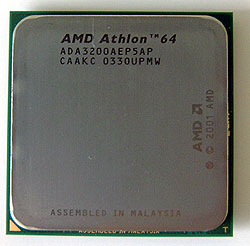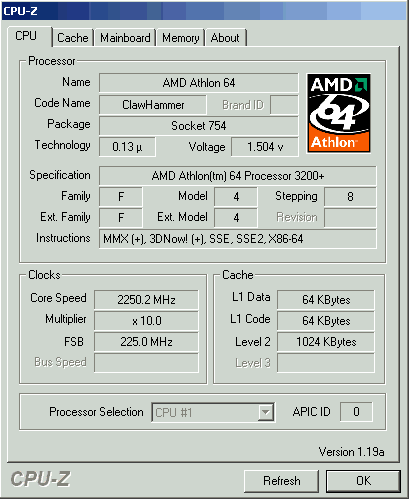 Overclocking the
Athlon64 is very much like overclocking a Pentium 4 processor now that AMD has
multiplier locked the processor. It may take a while for enthusiasts to get
use to the whole process.
Overclocking the
Athlon64 is very much like overclocking a Pentium 4 processor now that AMD has
multiplier locked the processor. It may take a while for enthusiasts to get
use to the whole process.
Because the memory controller and clock generator are built
into the core of the processor, overclocking the chip can be a lot more tricky
as memory controllers tend to max out very quickly. Also not much is known about
the integrated clock generator and about how high it can go.
On a side note, before we get into the numbers I think
it is important to mention that although we have used the term "FSB" in the
following pages, the Front-Side-Bus isn't really applicable anymore to the
Athlon64. As an AMD Representative puts it; "The 200MHz clock generator
feeds the components of the motherboard (including the CPU), but it is not
the speed of the CPUs interface to the memory controller or to the chipset. The
old term FSB has always represented the speed at which the processor moves
memory traffic and other command and data traffic to and from the chipset.
Because the memory controller is located on the processor die, that memory
subsystem traffic no longer has to go through the chipset or CPU-to-memory
calls. With Athlon64 processors, the speed at which the CPU and memory
controller interface is full processor frequency - the speed at which the
processor and chipset communicate is dependent on the chipset's Hypertransport
spec which can be at speeds of up to 1600MHz."
As the motherboard BIOS we tested with still uses
the term "FSB" to facilitate overclocking, we will continue using it for the
moment as well.
In any
case, using the stock AVC Z7UB30 heatsink we started to raise the clock speed of the
motherboard. At around 210 MHz "FSB" we ran into a few stability problems, but
raising the memory voltage to 2.8V fixed that. At 221 MHz "FSB" we again ran into memory related issues
and had to run the memory at 6:5 memory divider (DDR333 mode). We were a bit
surprised that our Corsair XMS3500 CAS2 DIMM's maxed out so quickly as they
easily run at 225-230 MHz "FSB" in dual channel mode with the most aggressive
timings on nForce2 motherboards. Perhaps the Athlon64's integrated memory
controller was starting to max out?
With the
6:5 memory divider enabled we seemed to hit the wall at 223 MHz "FSB." No matter
what we tried we couldn't get the processor to run any faster. Another
interesting thing that we discovered no matter how high we set the Vcore on the
motherboard, the voltage the processor would only receive 1.5V.

